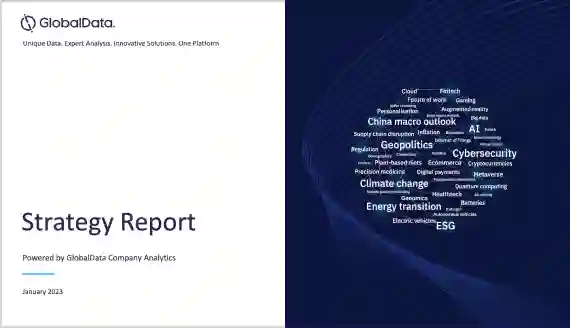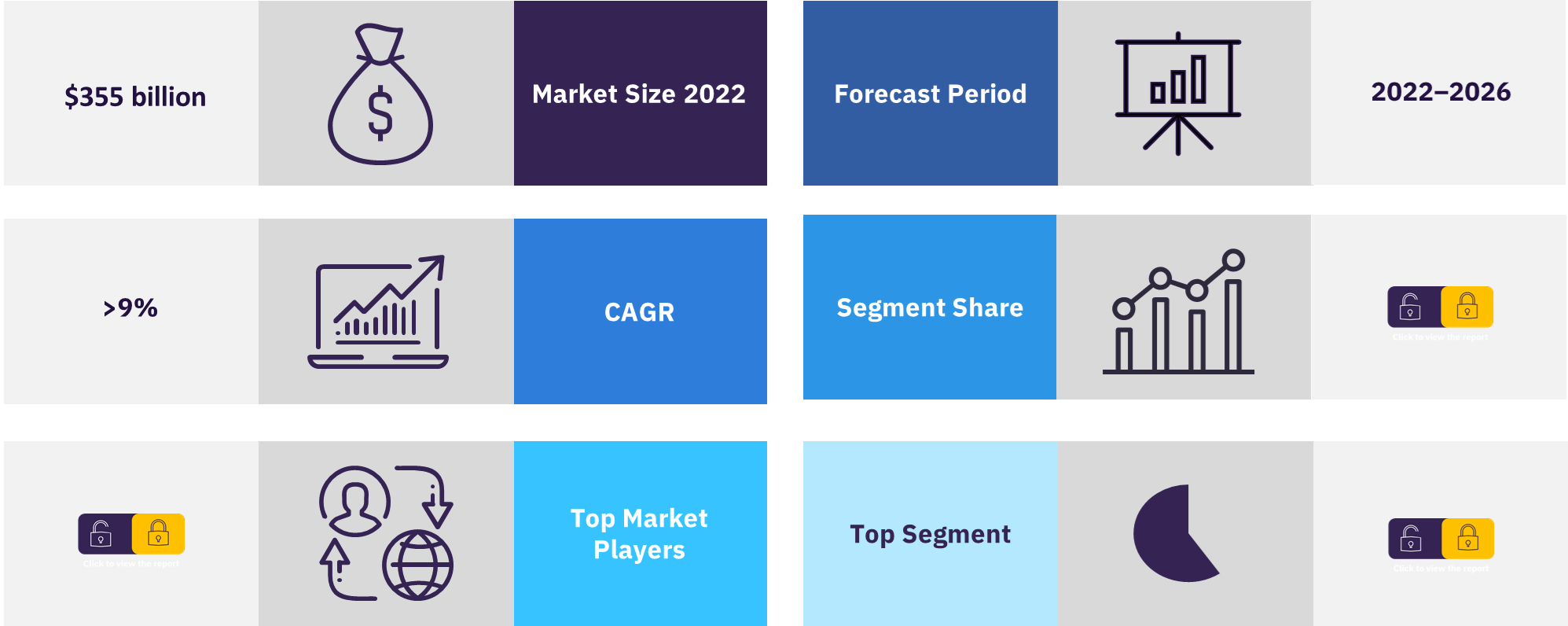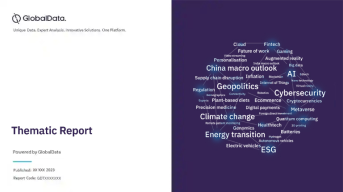Ecommerce in Consumer Goods, 2022 Update – Thematic Research
Powered by ![]()
All the vital news, analysis, and commentary curated by our industry experts.
The global e-commerce market in the consumer goods industry is valued at $355 billion in 2022. The market is expected to grow at a CAGR of more than 9% during the forecast period. As online shopping evolves to provide more nuanced solutions, brands and manufacturers will need to understand the changes in consumer online shopping behaviors. Online engagement intended to drive e-commerce purchases is becoming more sophisticated as consumer interactions increasingly include a wider range of digital tools and elements.
E-commerce has proved to be a vital route to market during the pandemic and has acted as a workaround to many supply chain and distribution challenges. The pivot made by many businesses to provide more online solutions has accelerated online sales growth beyond all predictions in the last couple of years. This has forced a change in strategy for many organizations and, when brand and investment plans are reviewed, businesses will need to appreciate both the challenges and the benefits that e-commerce will provide in the future.
Global e-commerce market overview
For more insights on this report, download a free report sample
Impact of E-commerce on the Consumer Goods Industry
E-commerce is evolving in line with the growing number of platforms and devices that consumers have access to and brands and manufacturers are having to evolve and adapt as these are integrated into consumers’ lifestyles. Having an e-commerce channel to direct consumers to is vital as the connectivity between multiple channels and platforms grows. It means that online traffic can be pointed to online retail options and allows brands the chance to convert online browsing into sales.
Due to the pandemic, consumers have had to adjust to spending more time at home and this caution is likely to exist for some time to come as they learn to live alongside the virus. During various stages of pandemic recovery, consumers are likely to resort to the comfort and reassurance of purchasing and consuming products at home and so e-commerce solutions will continue to be vital in facilitating this.
Ecommerce helps businesses to communicate directly with consumers and build brand loyalty. The ongoing dialogue that can happen digitally pre-and post-purchase around online sales provides brands and manufacturers with an extended period in which they can reach out directly to consumers, for example through mailing lists and chat options. Purchasing online also creates data that is more easily harnessed by companies and can be used to build better consumer profiles for future targeting as well as execute market research, allowing brands to test new products with subscribers.
Inflation and economic uncertainty can pile on extra pressure when it comes to brand and retailer negotiations. Maintaining margins and product listings can be made more difficult against a backdrop of rising material prices and tighter consumer budgets. Online listings can sometimes help circumvent some of these challenges as virtual shelf space is less restricted in terms of space and inventory can be managed and serviced differently in some instances. Also, cutting out retailers and supplying directly from brands or manufacturers through online channels can be a cost-saving opportunity and this can, ultimately, be passed on to consumers to increase value for money.
E-commerce in Consumer Goods – Value Chain Analysis
The value chains of e-commerce can be divided into five segments: customer interface, order management, transaction processing, fulfillment, and after-sales service.
Customer interface
The point at which customers interact with an e-commerce provider is known as the ‘customer interface’. This is usually a website or application that is designed to be easy to navigate and offers a pleasant shopping experience for the user. An ideal customer interface includes all the information that a customer would need to purchase a product or service.
Order management
Order management involves keeping track of orders and managing the process required to trigger a payment notification to the user. The key benefits of an effective order management system for businesses include better visibility at each step of the order process, reduced risk of human error, improved efficiency, and greater accuracy.
Transaction processing
Transaction processing allows customers to make purchases over the internet, using a variety of payment methods. The process enables the immediate processing of each transaction and the simultaneous updating of records.
Fulfillment
Fulfillment is the process of delivering orders to customers. It is a key battleground for retailers selling online. Ecommerce companies must be able to deliver quickly, cheaply, and reliably if they are to compete effectively.
After-sales service
After-sales services refer to all processes that ensure customers are satisfied with the products and services they purchase. It includes returns, exchange or cancellation of the product or service, customer support and feedback, and loyalty programs. Good after-sales services can improve customer loyalty.
Key Consumer Goods Companies Associated with the E-Commerce Theme
The key consumer goods companies associated with the e-commerce theme are Anheuser-Busch InBev, Carlsberg, Coca-Cola, Colgate-Palmolive, Diageo, General Mills, Kraft Heinz, L’Oréal, Molson Coors, PepsiCo, Reckitt Benckiser (RB), and Unilever.
Specialist e-Commerce Vendors in the Consumer Goods Industry
The specialist e-commerce vendors in the consumer goods industry are Deliveroo, One Network Enterprises, Salesforce, SAP, and Shopify.
Ecommerce in Consumer Goods Market Report Overview
| Market size (Year– 2022) | $355 billion |
| CAGR (Growth Rate) | >9% |
| Forecast period | 2022-2026 |
| Value chains | Customer Interface, Order Management, Transaction Processing, Fulfillment, and After-Sales Service |
| Key consumer goods companies | Anheuser-Busch InBev, Carlsberg, Coca-Cola, Colgate-Palmolive, Diageo, General Mills, Kraft Heinz, L’Oréal, Molson Coors, PepsiCo, Reckitt Benckiser (RB), and Unilever |
| Specialist E-commerce vendors | Deliveroo, One Network Enterprises, Salesforce, SAP, and Shopify |
Scope
- Online engagement intended to drive e-commerce purchases is becoming more sophisticated as consumer interactions increasingly include a wider range of digital tools and elements.
- Ecommerce solutions are now diversifying into sub-channels such as direct-to-consumer (D2C), social media commerce (s-commerce), and quick commerce (q-commerce).
- The key themes and trends for immediate consideration will be centered around consumer demand for sustainability and value in line with convenience.
Reasons to Buy
- Understand multiple themes and company responses to tap into what is really impacting the industry.
- Gain a broader appreciation of the fast-moving consumer goods industry by gaining insights from both within and outside of your sector.
- Access valuable strategic take-outs to help direct future decision-making and inform new product development.
L’Oréal
Unilever
Kraft Heinz
AB InBev
Beyond Meat
Carlsberg
Coca-Cola
Reckitt Benckiser
Table of Contents
Frequently asked questions
-
What is the global e-commerce market size in the consumer goods industry in 2022?
The global e-commerce market in the consumer goods industry is valued at $355 billion in 2022.
-
What is the global e-commerce market growth rate in the consumer goods industry?
The global e-commerce market is expected to grow at a CAGR of more than 9% during the forecast period.
-
What are the different value chains of e-commerce?
The value chains of e-commerce can be divided into five segments: customer interface, order management, transaction processing, fulfillment, and after-sales service.
-
Which are the key consumer goods companies associated with the e-commerce theme?
The key consumer goods companies associated with the e-commerce theme are Anheuser-Busch InBev, Carlsberg, Coca-Cola, Colgate-Palmolive, Diageo, General Mills, Kraft Heinz, L’Oréal, Molson Coors, PepsiCo, Reckitt Benckiser (RB), and Unilever
-
Which are the specialist e-commerce vendors in the consumer goods industry?
The specialist e-commerce vendors in the consumer goods industry are Deliveroo, One Network Enterprises, Salesforce, SAP, and Shopify.
Get in touch to find out about multi-purchase discounts
reportstore@globaldata.com
Tel +44 20 7947 2745
Every customer’s requirement is unique. With over 220,000 construction projects tracked, we can create a tailored dataset for you based on the types of projects you are looking for. Please get in touch with your specific requirements and we can send you a quote.












